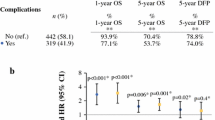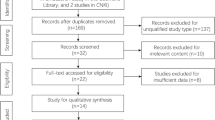Abstract
PURPOSE: There is evidence of a relationship between inflammation and cancer growth and spread. Cardiopulmonary bypass surgery is known to induce a systemic inflammatory response. The aim of this study was to determine whether cardiopulmonary bypass surgery influences the cancer-specific survival rate in patients with colorectal cancer. METHODS: The Fremantle Hospital database on patients with colorectal cancer (477 patients) was linked to the Western Australian Hospital Morbidity Database System. Patients who had colorectal cancer after having undergone cardiopulmonary bypass surgery (n=7) were identified. The cancer-specific survival rate for these patients was compared with that for a group of controls derived from the hospital database. Controls were matched for age, gender, tumor location, tumor stage, operative procedure, and adjuvant therapy (n=26). RESULTS: The cancer-specific survival rate of the seven patients with colorectal cancer who had undergone cardiopulmonary bypass surgery was significantly lower than that for control patients (5-year survival rate, 34vs. 71 percent, respectively;P<0.05; hazard ratio, 2.9; 95 percent confidence interval, 1.5–4.4). Of the two patients in the study group who survived for 18 months, one had liver metastases and the other had local recurrence of a rectal cancer. CONCLUSION: In patients with colorectal cancer, having undergone cardiopulmonary bypass surgery was associated with a reduced cancer-specific survival rate. Additional studies are required to validate this association and explore the possibility of a causal relationship.
Similar content being viewed by others
References
Fujita S, Teramoto T, Watanabe M, Kodaira S, Kitajima M. Anastomotic leakage after colorectal cancer surgery: a risk factor for recurrence and poor prognosis. Jpn J Clin Oncol 1993;23:299–302.
Weiss L. Some mechanisms of mechanical trauma on the development of primary cancers and their metastases. J Forensic Sci 1990;35:614–27.
Nowacki M, Janik P, Nowacki P. Inflammation and metastases. Med Hypotheses 1996;47:193–6.
Olsson I, Gatanga T, Gullberg U, Lantz M, Granger G. Tumour necrosis factor (TNF) binding proteins (soluble TNF receptor forms) with possible roles in inflammation and malignancy. Eur Cytokine Netw 1993;4:169–80.
Dvorak H, Detmar M, Claffey K, Nagy J, van de Water L, Senger D. Vascular permeability factor/vascular endothelial growth factor: an important mediator of angiogenesis in malignancy and inflammation. Int Arch Allergy Immunol 1995;107:233–5.
Aulitzky W, Huber C, Peschel C. Cytokine therapy of neoplastic and inflammatory disease. Int Arch Allergy Immunol 1993;101:221–6.
Butler J, Rocker G, Westaby S. Inflammatory response to cardiopulmonary bypass. Ann Thorac Surg 1993;55:552–9.
Menasche P. The inflammatory response to cardiopulmonary bypass and its impact on postoperative myocardial function. Curr Opin Cardiol 1995;10:597–604.
Moat N, Shore D, Evans T. Organ dysfunction and cardiopulmonary bypass: the role of complement and complement regulatory proteins. Eur J Cardiothoracic Surg 1993;7:563–73.
Edmunds L. Why cardiopulmonary bypass makes patients sick: strategies to control the blood-synthetic surface interface. Adv Card Surg 1995;6:131–67.
Platell C. A community-based hospital experience with colorectal cancer. Aust N Z J Surg 1997;67:420–3.
Bresalier R. The biology of colorectal cancer metastasis. Gastroenterol Clin North Am 1996;25:805–20.
Busch O, Hop W, Marquet R, Jeekel J. Blood transfusions and local tumour recurrence in colorectal cancer. Evidence of a non causal relationship. Ann Surg 1994;220:791–7.
Author information
Authors and Affiliations
Additional information
Supported by the Department of Surgery, University of Western Australia.
Read at the meeting of the Surgical Research Society of Australia, Sydney, New South Wales, Australia, August 13 to 14, 1998.
About this article
Cite this article
Platell, C. Influence of cardiopulmonary bypass surgery on cancer-specific survival rate of patients with colorectal cancer. Dis Colon Rectum 41, 1371–1375 (1998). https://doi.org/10.1007/BF02237052
Issue Date:
DOI: https://doi.org/10.1007/BF02237052




